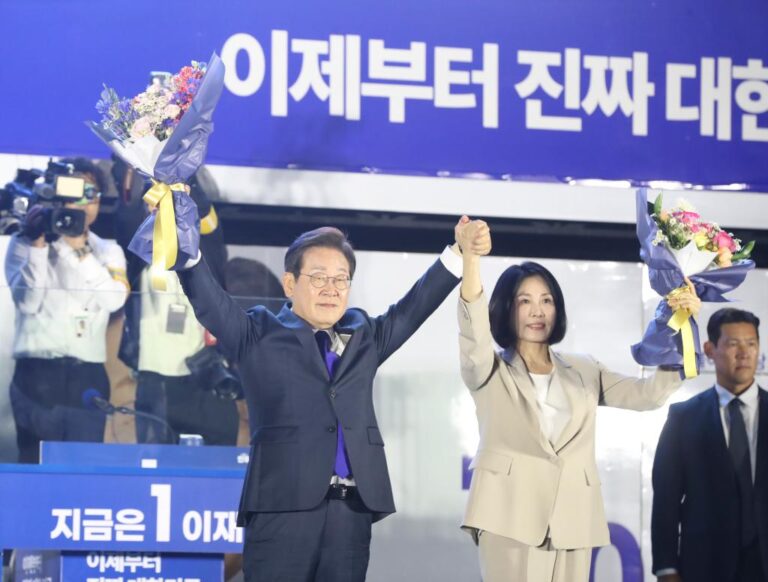* Lee Jae-myung’s majority liberal Democratic Party won 49.42 percent of support, defeating his rival Kim Moon-soo of the conservative People Power Party by a broad margin of 8.27 percentage points.
* Lee’s new government faces four major challenges: achieving national unity and stability, revitalizing South Korea’s economy, adjusting the country’s foreign policy, and easing tensions on the Korean Peninsula.
* Trade policy toward the United States is also a key determinant in the early stage of governance of the administration.
SEOUL, June 4 (Xinhua) — South Korea has ushered in a new political chapter as newly-elected South Korean President Lee Jae-myung was sworn in on Wednesday as the nation’s 21st president.
While the victory offers Lee and his majority liberal Democratic Party significant momentum to steer the nation’s future, Lee’s new government faces four major challenges: achieving national unity and stability, revitalizing South Korea’s economy, adjusting the country’s foreign policy, and easing tensions on the Korean Peninsula.
In terms of foreign relations, much attention is focused on how Lee will respond to the impact of U.S. tariff policies and how he will implement “pragmatic diplomacy.”
VICTORY AS EXPECTED
Lee’s party won 49.42 percent of support, defeating his rival Kim Moon-soo of the conservative People Power Party (PPP) by a broad margin of 8.27 percentage points, according to the final vote count released by the National Election Commission on Wednesday.
As the election is being held early to replace impeached former President Yoon Suk-yeol, the new president took office immediately without a transition period.
The results came as no surprise, as pre-election surveys and exit polls all suggested Lee’s lead in voter support. Analysts believe that public sentiment regarding a “political turnover” was one of the main factors that propelled Lee to victory amid controversy under Yoon’s leadership.
Before the botched martial law bid, Yoon’s government approval ratings had dropped to just over 10 percent. During the election campaign, voices emerged calling on Yoon to leave the PPP, but he did so less than 20 days before the vote, which was believed to have affected the outcome.
Meanwhile, the internal frictions within the PPP significantly weakened its election outcome. Following Yoon’s impeachment, the PPP struggled to restore unity. The last-minute negotiation drama between Kim Moon-soo and Han Duck-soo underscored the depths of the party’s discord, with PPP members squabbling over candidate selection until the official submission deadline.
CHALLENGES AHEAD
Yoon’s short-lived imposition of martial law last December has led to endless internal strife among the country’s major political factions, causing government operations to come to a near halt. In a televised speech on Wednesday, Lee told supporters that he will move past his predecessor’s insurrection and ensure that a military coup never happens again.
On the economic front, the new president faces a grim outlook. At the end of May, the Bank of Korea scaled back the country’s GDP growth forecast for 2025 from 1.5 percent to a modest 0.8 percent, citing rising inflation, weak domestic consumption and potential blows to South Korean exports, particularly by U.S. tariffs, as risks to economic growth.
According to Yonhap News Agency, trade policy toward the United States is also a key determinant in the early stage of governance of the next administration. Byoung Hoon Seok of the Department of Economics at Ewha Womans University said that the biggest variable for this year’s economic growth is the tariff negotiation with the United States.
In a prior TV debate featuring presidential candidates, Lee emphasized the importance of tariff negotiations with the United States. He said that prioritizing national interests is crucial and expressed no urgency in finalizing an agreement quickly.
In terms of foreign policy, Lee emphasizes “pragmatic diplomacy.” He stated that he plans to restore communication channels between South Korea and the Democratic People’s Republic of Korea, including the military hotline, and encourage both sides to cease tension-provoking actions and promote inter-Korean dialogue and exchange.
Lee further proposed expanding South Korea’s diplomacy and strengthening cooperation with the Global South. He also said he would develop relations with China, the United States, Japan and Russia based on South Korea’s national interests.
He previously stated that China is a key trading partner of South Korea and will handle South Korea-China relations in a stable manner. (Video reporters: Yoo Seungki, Chen Yi, Yang Chang, Liu Shengji, Jin Haomin; video editors: Zhang Yucheng, Hui Peipei, Zheng Qingbin, Liu Ruoshi)■

